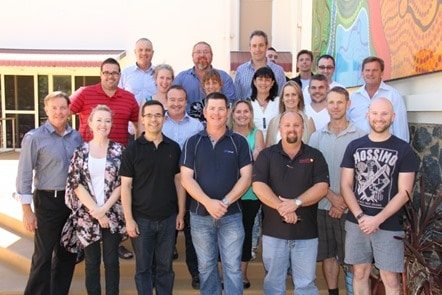Originally posted on January 14, 2016 @ 8:21 PM
Learning is a Social Activity

Image: Group 3 – Post Grad – Social Psychology of Risk – Guest Lecturer Rob Sams in Red Shirt
However, as I reflect on the last three years and consider the year ahead, what I recognise as being the most valuable, in fact the single most critical facet of my learning, is that is has been done through communing with others.
I’ve come to realise that if we are to better understand what it means to learn and understand ‘why’, our attention needs to shift away from focusing on how we gather and process information and data (‘techniques’), to recognise that learning is a social activity. That is, one that is most effective when we share, discover and search for the truth together with others. Humans are communal creatures and learning is a communal (social) activity.
To begin an understanding of learning as a social activity, I turn to one of my favourite authors that I have been introduced to over the past few years, Parker J. Palmer.
In his book To Know as we are Known (2003), Palmer explains;
But scholars now understand that knowing is a profoundly communal act. Nothing could possibly be known by the solitary self, since the self is inherently communal in nature. In order to know something, we depend on the consensus of the community in which are rooted – a consensus so deep that we are often drawn upon it unconsciously.
(Palmer 1993, p. xv)
Going on from this, Palmer in his short video on the ‘Myth of the Individual’, refers to the paradox of co-existing as an individual in a communal world? I suspect this, along with the paradox of ‘messiness’ co-existing in a world where equivocality is the ‘enemy’, are the reasons why social learning is not better understood in risk and safety; an industry that is so dominated by binary ‘methods’ and ‘techniques’, and one that does not seem to cope well with paradox.
Moving on from Palmer, the next point that I have learnt is of the importance and power of Dialectic in learning and knowing (another messy and ‘un-binary’ topic). I had not heard of the term dialectic three years ago, let alone understood its importance in learning. To seek to establish ‘truth’ with others, who hold different worldviews to me, through the practice of reasonable argument and while being aware of my own agenda and biases, is essential if I want to grow, mature and develop (learn). In my career to date in risk and safety, I’ve not experienced dialectic, instead the ‘debates about truth’ usually begin (and end!) with “section 123 of the xyz Act states that…(insert instruction here)”. So no debate really, just do what I say!
While I’m still coming to grips today with the concept of dialectic, what I am discovering is that if I am prepared to accept my own ignorance and vulnerabilities, and if I sincerely seek to understand the truth, rather than think in fact, data and evidence (binary) I will continue to live, grow and develop, rather than just exist. It might be messy, but that’s ok with me.
Do we recognise and accept that learning is a social activity in risk and safety?
I’m not so sure we do if the latest promotion on how to do site inductions as promoted by the safety regulator in the State of NSW in Australia is anything to go by.
While I don’t intend to critique the advice of the regulator (Dr Rob Long has already done a good job of this), my questions is how do we move away from this approach of indoctrination and oppression adopted by the regulator and better support our industry to realise that learning is a social activity? It appears that the Regulator is not going to go down this path anytime soon.
I’m interested in understanding how we can ‘search for the truth’ through communing in risk and safety. I wonder is these questions might be useful for us to consider?
· What cues can we look and listen out for that might demonstrate the ‘myth of the individual’ as we observe and converse in our organisations? What can we do about this?
· How do we create forums where we can commune and ‘search for the truth’ through reasonable argument, rather than demonstrate and fester the ‘one-upmanship’ that is so rife in existing forums such as LinkedIn?
· What can we do to support others to realise the essential nature of communality in understanding learning as a social activity?
We’d love to hear your thoughts, experiences and comments.
Author: Robert Sams
Phone: 0424 037 112
Email: robert@dolphyn.com.au
Web: www.dolphyn.com.au
Facebook: Follow Dolphyn on Facebook



Do you have any thoughts? Please share them below